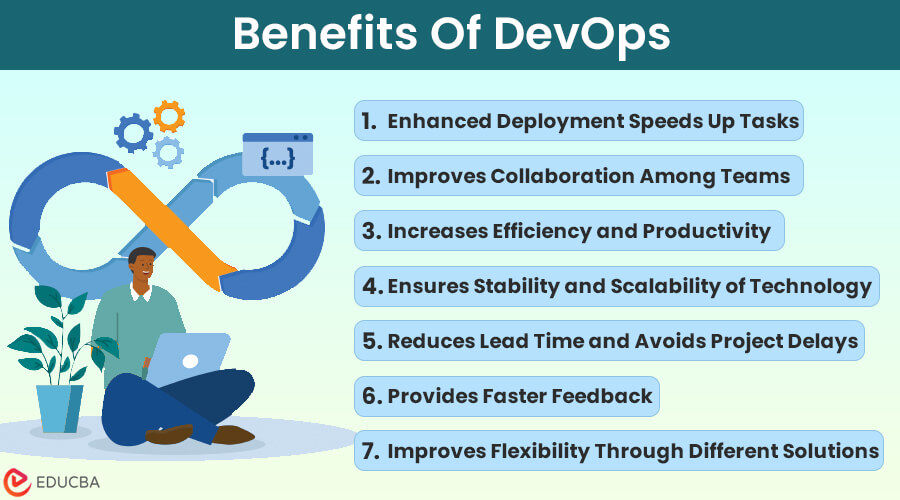
Why Developers Need to Know the Benefits of DevOps?
Tech-loving professionals and students looking forward to careers in the tech industry are excited about DevOps training online. And you know what? It’s totally worth it! DevOps is a set of practices that help software development and IT operations teams work together smoothly to deliver software faster and more efficiently. If you become a DevOps expert, you can enjoy many advantages in today’s tech world. Check out our article on the benefits of DevOps to see how it can make a big difference.
Top 7 Benefits Of DevOps
Here are some benefits of DevOps explained:
1. Enhanced Deployment Speeds Up Tasks
DevOps makes the deployment of tasks seamless and fastens the activities by streamlining collaboration between teams. The proven methods of continuous integration and continuous deployment (CI & CD) enable DevOps infrastructure to do so.
Moreover, using DevOps, your team can deploy automation to improve the speed of time-consuming tasks such as testing, communication, and validation. Recent reports suggest that software firms find an unbelievable 30% improvement in workforce management speed after implementing DevOps. Therefore, having expertise in DevOps can lead to magical benefits in workforce management and deployment.
2. Improves Collaboration Among Teams
Collaboration can be a big challenge in software companies, even the large ones. However, using DevOps practices can make things easier and boost your team’s productivity. DevOps helps teams work together by sharing tasks, assignments, and programming tools on one platform. This way, responsibilities can be divided efficiently to reach goals faster.
Here are some ways DevOps improves collaboration:
- It is a single channel to share goals and tasks.
- Uses automated processes to share and check tasks easily.
- Solves conflicts quickly to avoid delays.
- Sets up a smooth and trouble-free infrastructure for collaboration.
3. Increases Efficiency and Productivity
Traditional management methods often struggle with repetitive tasks and inefficient processes. However, when using DevOps for management, significant improvements are seen in efficiency and productivity.
Here’s how DevOps increases efficiency:
- Instead of dealing with tasks separately, DevOps lets you manage various tasks simultaneously.
- DevOps uses automation to lessen the burden of repetitive tasks, saving time and making things more organized.
- By organizing channels and simplifying workflows, DevOps reduces the team’s workload, making individuals more productive.
4. Ensures Stability and Scalability of Technology
Improving the stability and scalability of your technology setup is crucial, and different DevOps pipeline methods can help make things smoother. Programming complexity can be simplified using premium DevOps techniques, mainly through automation and continuous deployment.
Here are some easy-to-follow tips for boosting infrastructure stability with DevOps:
- Make small testing and validation tasks automatic when you are deploying.
- Keep giving feedback consistently during development.
- Let the system automatically fix small bugs and problems before they get to the testing team.
- Use stable code frameworks that don’t need developers to step in to speed up tasks.
5. Reduces Lead Time and Avoids Project Delays
DevOps infrastructure helps your team quickly adapt to market demands without wasting time. It ensures that your team works together towards common goals, preventing delays in project execution. By implementing DevOps pipelines in your tech setup, you can reduce lead time and improve your ability to respond to constantly changing market needs. This results in better-quality deliverables due to efficient time management and streamlined processes.
6. Provides Faster Feedback
Getting feedback is crucial for improving your product and ensuring it meets your customers’ needs. However, many companies struggle to implement feedback effectively because they either lack time or a proper system for collecting feedback.
Using DevOps lets your team get feedback more quickly and set up a better management system. Additionally, DevOps can handle simple questions and feedback automatically, reducing the need for manual intervention. It not only saves time but also makes the process smoother.
7. Improves Flexibility Through Different Solutions
Flexibility is crucial for getting the best results in a busy software environment. DevOps provides this flexibility by offering solutions that balance different needs. The DevOps pipeline organizes tasks based on when team members are available and how complex the tasks are. It makes it easier to complete tasks without any issues.
Moreover, DevOps encourages the entire team to work towards a shared goal by simplifying development, deployment, and testing. It makes DevOps essential for creating a smooth, flexible infrastructure that boosts productivity.
Final Thoughts
DevOps revolutionizes the tech industry by fostering collaboration, enhancing efficiency, and ensuring quick adaptability to market demands. With the benefits of DevOps ranging from streamlined deployment to improved feedback loops, DevOps emerges as a vital tool for organizations. It aims to align its teams and efficiently navigate the ever-evolving software development landscape.
Recommended Articles
This has been a guide to the benefits of DevOps. Here, we discuss the introduction and benefits of DevOps with a detailed explanation. You can also go through our other suggested articles to learn more –

